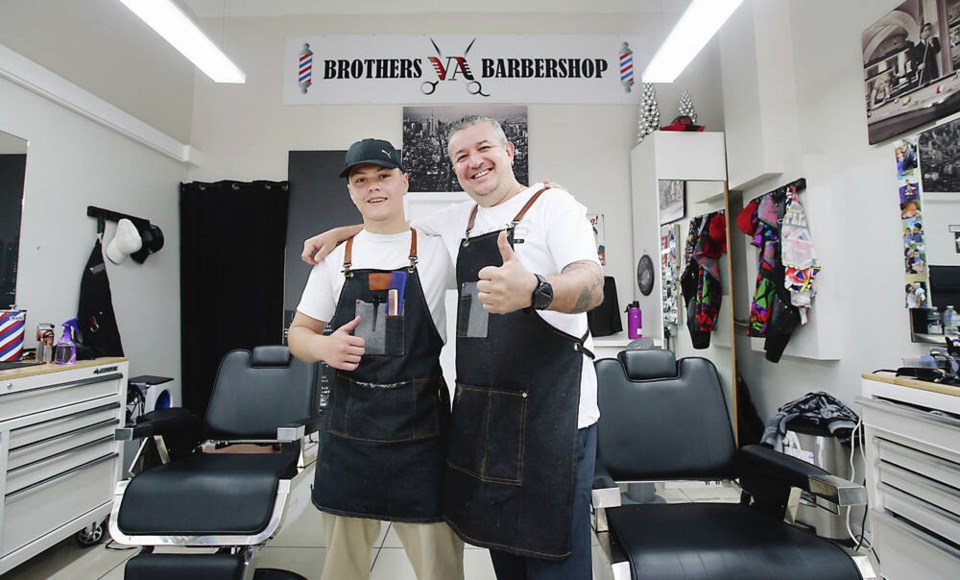In May, when Visar Gashi learned about this Ukrainian kid who knew how to cut a hair a little, he heard echoes of his own story.
Visar — his customers call him Vic — was 21 when he and his brother Artor, two years his junior, were forcibly expelled from their native Kosovo during the war with Serbia in 1999.
They were cutting hair at a refugee camp in Macedonia (buzz cuts only, because of the lice) when Canada came to the rescue, flying 5,000 Kosovars to this country in an emergency airlift. The Gashis now own Victoria’s Brothers Barbershop — two shops, actually, one on Fort Street, the other in Langford.
Fort Street is where we find Visar on this day, looking down the row of barber chairs to where 17-year-old Oleksii Liashenko — the customers call him Alex — is carefully tending someone’s follicles.
“He came in pretty much the same situation I did,” Visar says. “I was one of them 20 years ago.”
That’s why he pulled Oleksii into the shop, stuck him on the path to becoming a licensed barber, absorbing all the expenses a neophyte would normally face.
For Oleksii, it has been a whirlwind. In February he was just another student in Kryvyi Rih, the hometown of Ukrainian president Volodymyr Zelenskyy. Then the Russians invaded and suddenly everyone was scrambling to fashion Molotov cocktails and anti-tank devices. A couple of months later, Oleksii was on the road, ushering his unilingual grandparents across the border to Hungary and a flight to Canada, where he had an aunt in Victoria.
It was while packing a few clothes for that exodus — extra shoes, underwear, a couple of T-shirts — that he was struck by how much he was leaving behind. No more studying aviation logistics at college. No more life at home with his pharmacist mother and truck driver father. No more friends.
“It turned the direction of my life,” he says of the war.
He is grateful for what he has. “I like the people here.” Canadians have been welcoming. “Nobody says ‘Go back to your country.’ ” Strangers provided Oleksii and his grandparents with somewhere to live.
He talks about going to college, getting a driver’s licence, earning enough to rent a place and help bring his parents here this fall.
The teenager is thankful for the people at the barber shop. “They’re like a second family for me.” Lots to learn, though, both about barbering — “I’m practising, practising every day” — and Canadian life. Speaking English all day leaves him feeling like his brain is boiling.
The thing is, Oleksii is one of the lucky ones. Canadians, so absorbed by the war this spring, have allowed their attention to drift. The flood of support has slowed to a trickle even as Ukrainians flow in. In March and April, the phone at Victoria’s Ukrainian Cultural Centre rang all day long with offers of help. Today, office manager Victoria Grando can have a conversation uninterrupted. That’s not a good thing.
What do the newcomers need? “Housing and jobs,” she says. Work for those who can’t speak English is particularly scarce.
Cultural centre president Devon Sereda Goldie says 348 Ukrainians have been settled on Vancouver Island through the Help Ukraine VI umbrella group. She estimates another 150 have been helped by family or arrived independently.
Many more are in the queue: There are 2,000 names on the waiting list, but fewer than 10 Vancouver Island host families remain available to house them.
Resources haven’t kept pace with demand. The cultural centre has been using donations from the public to pay for federally mandated medical tests that cost about $300 per person, but that money is almost gone now. Donations are drying up — inevitable as attention turns to other stories.
People who arrived in Canada as refugees don’t forget what it’s like, though. Visar Gashi can remember being back in the Balkans, holding onto an engagement ring for month after month, wanting peace to return before proposing to his girlfriend Edita. He finally gave up waiting and popped the question even as the fighting raged. “I didn’t want to die with the ring in my pocket,” he said. Visar and Edita now have three Canadian-born children who have no idea what war is like.
Right next to the Fort Street barbershop is another refugee-owned business, Hiep Nguyen’s Pho Vy restaurant. In the 1980s, he almost drowned while fleeing Vietnam for the Philippines, where he spent two years in a refugee camp. In Victoria, he worked his way up the ladder: $2.50-an-hour janitor, then dishwasher, then chef. It was eight years before he was finally reunited with the wife and son he had left in Vietnam. He’s effusive in his gratitude to Canada for allowing them a future here.
You can find stories like that all over this country. More than 60,000 boat people made it here from Vietnam. A quarter-million refugees came to Canada after the Second World War. Another 37,000 Hungarians fled here after the failed uprising of 1956 and 11,000 Czechoslovakians after Moscow crushed the Prague Spring in 1968. More recently, 69,000 Syrians found safety between November 2015 and October 2019. Close to 17,000 Afghans have arrived since last summer.
As of last week, 65,000 Ukrainian-born people had entered Canada this year. Can’t say how many were driven out by the invasion, as the number also includes those with permanent resident status or who arrived as tourists or students. More are coming: A total of 263,753 temporary-residence permits had been approved by July 20.
Think people, not numbers. People who remember how hard it was to live back in their homelands, and how hard it was to find their feet once here.





